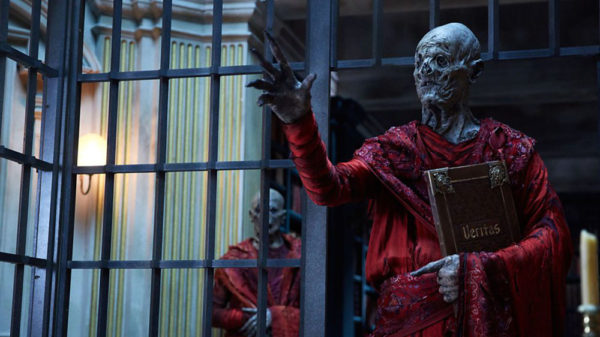‘Extremis’, the 6th episode of Doctor Who season 10, is packed full of Steven Moffat’s trademark high-concept themes and plot twists. Oh, and it’s dark – very dark.
Doctor Who has always been great at making you feel sympathy for the strangest things. Just this season, we’ve been invited to consider the perspective of alien puddles, sentient emoji-bots, and a giant lizard creature. In this show, the boundaries of empathy don’t stop with your everyday human beings with thoughts and feelings we can relate to as an audience, and it’s been all the better for it.
Still, I genuinely never expected Doctor Who to make me feel sorry for background video game characters, let alone consider the plight of Super Mario. Yet this happened during an episode that was marketed as a Dan Brown conspiracy thriller with a mystical religious text at its centre.
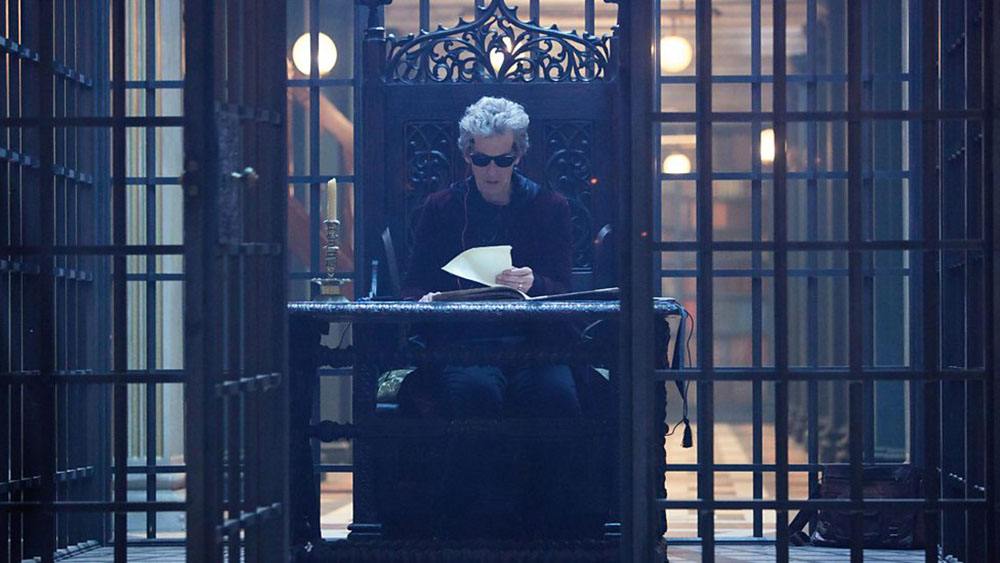
‘Extremis’ is a hell of an unusual episode. After the relatively conventional meat-and-potatoes Who of the first five episodes, the sheer weirdness and off-the-wall experimentalism of this episode is a shock to the system.
Series 10’s first episodes have felt like a throwback to the Russell T Davies days, but this was pure Steven Moffat, an episode filled to the brim with existentialist themes and meta-fictional twists. I suspect this may be the first episode this season to really, genuinely, divide people. It’s conceivable that you, dear reader, hated every inch of it, and I can understand that complete (theoretical) antipathy.
For me, though, this was a winner, and a worthy challenger for ‘Oxygen’ for the best episode of the season so far. ‘Extremis’ might not reach the creative brilliance of something like ‘Heaven Sent’, but it delivers exactly what this season has been lacking: big, overwhelming, baffling ideas.
Steven Moffat’s scripts have always been built upon deceptively simple what-if premises – what if the Doctor was all alone? What if the Doctor wasn’t there at all? – and ‘Extremis’ has a premise that rivals the best of them; what if the Doctor wasn’t real at all?
But let’s step back from that premise for the second, because it’s only revealed to us once the last bits of the puzzle box click open. From the start, even before its meta-twist, ‘Extremis’ is doing something very unusual in its storytelling – it’s telling two very separate stories with no link between them that’s initially discernible.
So, What’s In The Box?
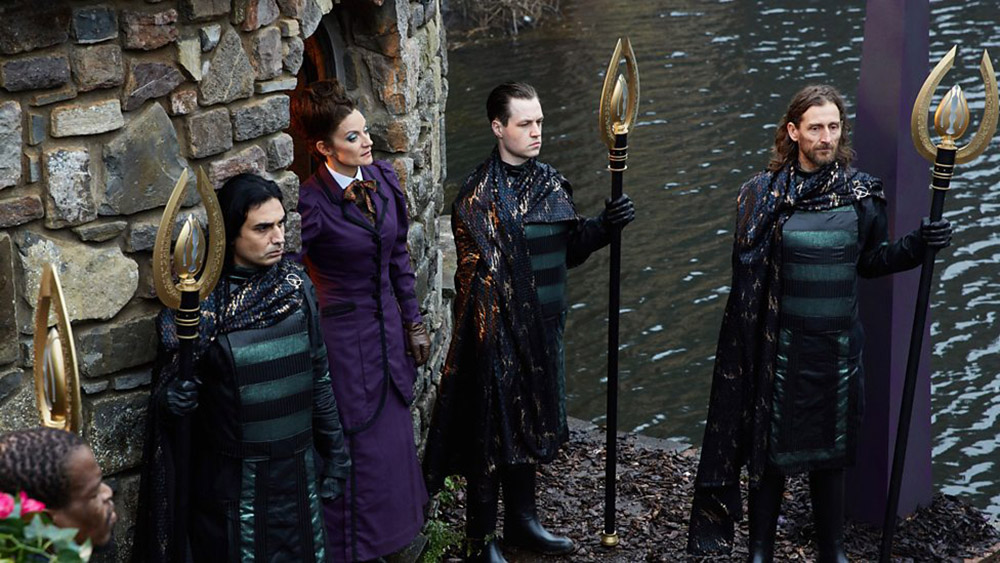
On one hand, there’s the episode’s main narrative that introduces the Veritas to us, and on the other, there’s this weird side story from the recesses of this Doctor’s past featuring his near-execution of Missy.
It’s a careful balancing act to make sure that hopping between stories works, and ‘Extremis’ wobbles a bit in the early goings because Missy’s story is so isolated from what’s going on in the Vatican, even with the gratification of the Vault reveal that draws a line between the distant past and present day. Oh, Missy was in the Vault. It’s what you predicted. ‘Extremis’ seems to know that, and doesn’t present it as much of a twist at all. It’s not a big deal. Anyhoo. Moving swiftly on.
It’s part of a wider sense of establishing the scaffolding in the episode’s first act. ‘Extremis’ is an incredibly dense story, and it requires a lot of exposition and establishment of the emotional stakes before it can really get to the fireworks of revealing what’s going on.
For these early scenes, the episode has to coast by on atmosphere and intrigue alone. It’s helpful, then, that ‘Extremis’ is as atmospheric and moody as Doctor Who has been in quite some time. Reflecting the Doctor’s blindness and hidden despondency, every set in the first half such as the Haeriticum is filled with ominous shadows and pockets of darkness.
Characters, like Cardinal Angelo, whisper conspiratorially, as if they’re ashamed, or even terrified of every word that comes out of his mouth – and, considering he’s a priest talking about a blasphemous book that has provoked mass suicides, that shame/terror seems pretty justified. I praised ‘Oxygen’ for being boldly dark in tone last week, but that seems premature in the light of this episode.
The Monks
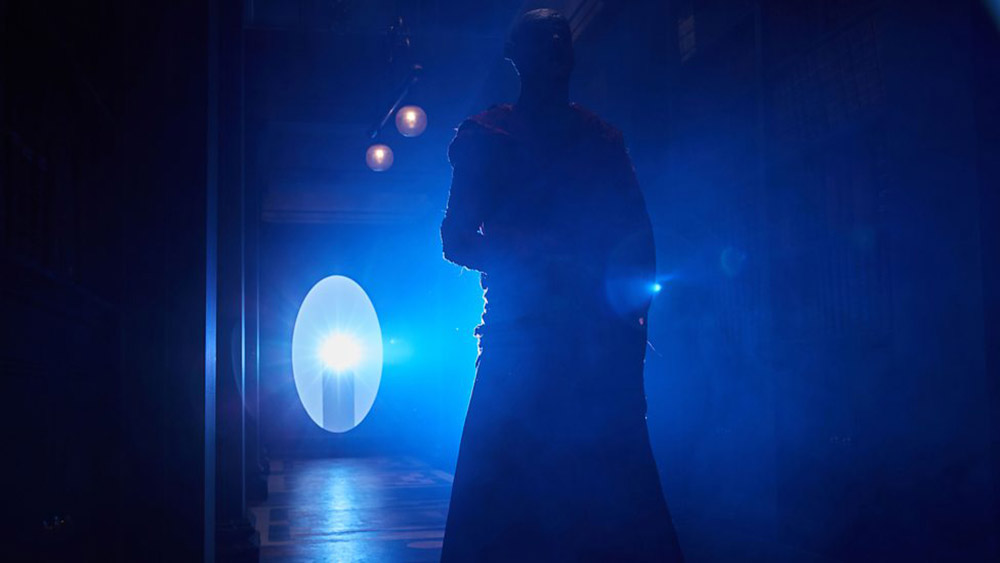
In essence, ‘Extremis’ is excellent at creating an overwhelming sense of disjunction and uncertainty – it’s no surprise that the episode’s villains, the Monks, are obscured from us in their early appearances, cloaked in light with only a humanoid silhouette distinguishable – but it feels like an odd accompaniment to the blazing sunshine of an early evening in late May.
And then come the Monks, where ‘Extremis’ really begins to click. 20 minutes of atmosphere and intrigue coalesce into something that’s genuinely thrilling in a way that retains the eerie mystery of the unknown.
The reveal of the monsters is a killer moment of directorial finesse, showing the Doctor groggily blinking at what he believes to be the cardinal advancing towards him until – snap – the gaping maw of a desiccated horror show of a creature is staring him in the face (I hope you jumped!).
For an episode that plays with truth and reality, the Monks are an ideal foe, lurking just on the edges of perception, bearing the surface similarity to a human but revealing their unrecognisable, monstrous faces on closer expectation in the same knowledge that their victims will be powerless to change anything at that point.
They’re an interesting opponent for this blind Doctor because they seem precision-engineered to attack this vulnerability, pushing the Doctor into a haze of confusion in a chase that would be a breeze in a normal episode as he struggles to escape the Vatican with the translation.
With their chillingly inhuman design and incredible levels of preparedness (these guys really did their invasion homework), ‘Extremis’ accomplishes what could arguably be said to be its most important goal, plot-wise, which is to establish these foes for when they translate their plans into action in the next episodes.
Looking at the Monks, ‘Extremis’ would seem to take the form of a prologue that seeks to establish a villain later episodes will be able to really have fun with. And in an orthodox sense, this is a prologue – its entire premise is that the heroes are caught inside the preparations for a coming invasion.
But the chief strength of ‘Extremis’ is that it never feels like a prelude to bigger things, because it turns that set-up function into an asset to explore the part of the story Doctor Who never explores – what the aliens do before they come to Earth.
Most aliens, I’d imagine, scope out the place and pick a plan of attack, hoping for the best but never, ever, planning for the Doctor. That’s not what the Monks do. Their method of prep is… somewhat more intensive.
“In Darkness, We Are Revealed”
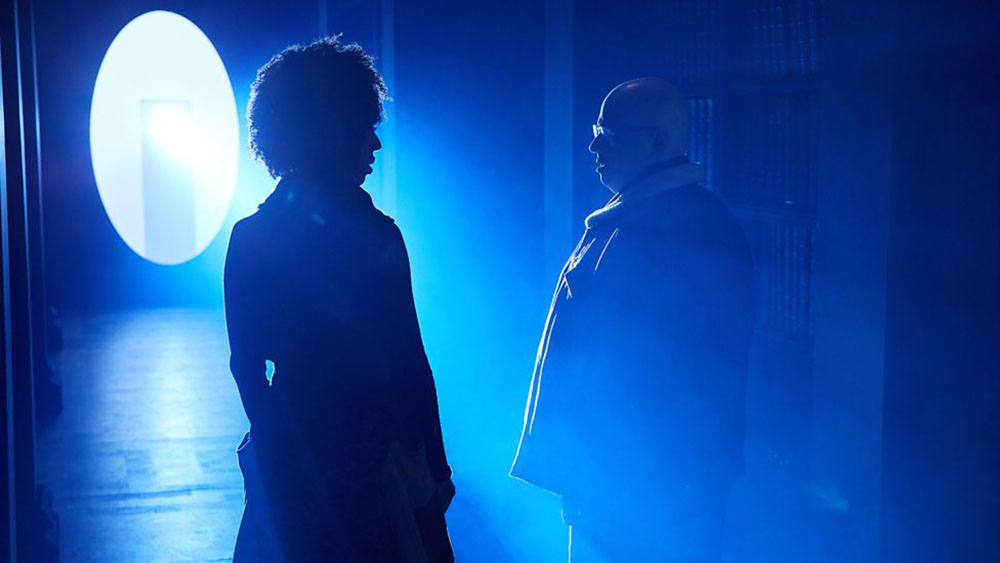
The reality of the simulation is slowly unveiled to us in fascinating fashion that plays with the extremities (heh) of what a family show like this can do. For instance, the scene at CERN is walking on a tightrope throughout, as it’s dealing with the pitch-dark theme of mass suicide and existential despair.
It never feels right for a second, before we get to the sticks of dynamite under the chairs and the creepy repetitions of numbers, but there’s still a sense that reality might prevail – that Bill and Nardole will talk the scientists off the ledge and diffuse the dynamite.
Instead, the countdown timer reaches zero, and that’s when everything snaps into place – something like that couldn’t possibly happen on Doctor Who. Therefore, it must be a trick or illusion of some kind. To make that point abundantly clear, Nardole then disintegrates into pixels. It’s that kind of episode.
‘Extremis’ reveals its hand late in the game, but the answers are satisfying and thematically impressive. All of the hints of the porousness and uncertainty of reality coalesce into a thesis statement of sorts on the nature of reality.
Some complicated ideas are explored in the resolution of the Veritas mystery, and it never backs down from the horror of the suicides that kickstart its narrative – there’s nothing more horrifying than the suggestion of one’s non-existence, after all. It’s an existential nightmare, where the only way out is for the simulants to lean into the insanity and define their own ‘existence’ by putting an end to it.
Yeah, it’s heavy stuff for a Saturday tea-time show, but it’s wrapped up, in true Steven Moffat style, in a big and showy ‘what-if’ idea, one that makes us feel sorry for the little guys on the fringes of video games who exist to provide the illusion of reality (which really, really isn’t the direction that you would expect from an episode that starts with the Pope visiting Bristol University).
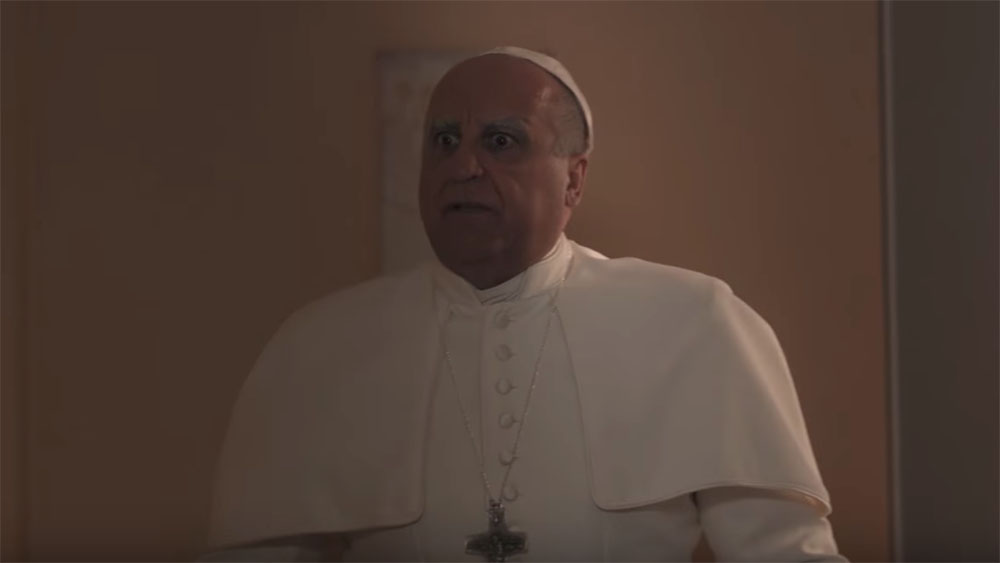
In Extremis
What works about ‘Extremis’, above all, is that it’s one of Steven Moffat’s final chances to use this show as his own sandbox for the mad ideas that seem to spring freely from his mind. While the basic skeleton of the premise is familiar sci-fi stuff, the execution of it, and the willingness to delve into the cosmic horror of people realising they don’t exist that it implies, is utterly fresh.
The situation enough to bring the Doctor to despair, certainly, which is where that flashback to long-ago finally links back. Truth be told, this takes a little too long to happen, and it doesn’t help that the flashbacks are haphazardly paced, chopped up so much that each one only inches the story forward, and then placed entirely to the side for so long that it’s easy to forget about the intricacies of the situation.
Nonetheless, the thematic value of this side story makes is a worthy addition. In a very roundabout sense, ‘Extremis’ tells a story of the Doctor tempted by the ease of a quick solution but inspired, by his own legend no less, to uphold his principles above all by saving the person who’s caused him, and the universe, so much pain.
It’s where the title comes from – the willingness to show virtue in the darkest and most compromising of situations, and the integrity and resourcefulness it suggests proves to be vital in providing a solution to the Doctor’s predicament in the present day.
We’ve never seen the Doctor quite so hopeless for the majority of the episode, with Peter Capaldi delivering a masterclass in repressed agony and disorientation as the Doctor keeps his pain bubbling well below the surface, which makes his inspiration in those final moments such a satisfying moment of vindication.
Even more satisfying is his ingenious way out, where ‘Extremis’ pulls its trump card. I don’t think I could have written a review this effusive without that reveal shot that the Doctor has been watching his own recording all along, following the story with us so he can be informed about the threat that’s coming.
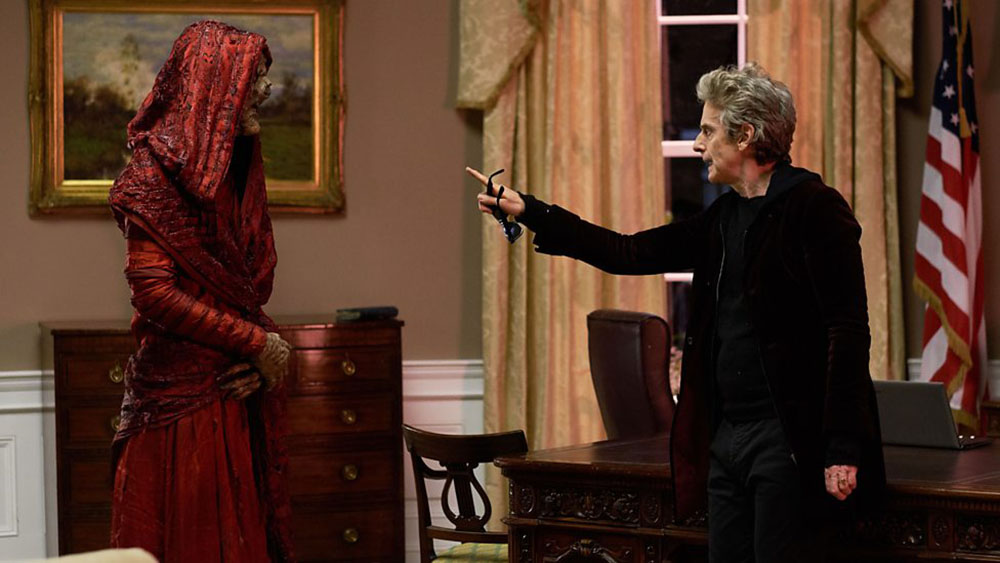
It’s little more than a flourish, but it feels like the moment where the episode’s intent perfectly matches up with its execution for the first time.
Aside from the fun meta-fictional aspect of it all (the Doctor watched an episode of his own show), it’s also a final twist that’s rife with interesting implications. Perhaps most importantly, it suggests the Doctor’s inspirational qualities of goodness and strength in the most adverse situations, as, in a weird causal loop of sorts, his own heroism inspires his real self to snap out of his morose depression and begin preparations for what’s to come.
While ‘Extremis’ deviates a long way from the general tone of Series 10, it’s here where the episode links up with its predecessors as it underlines the power of the Doctor as an inspirational, symbolic figure of utter integrity.
This, of course, is only the start of a larger story. We’ve seen the preparations, but there’s still the invasion and takeover to come later. Given how conceptually ambitious this opening chapter was, then, it’ll be intriguing to see just how the next episodes in this mid-season arc try to push the envelope in their own right, and how they’ll run with the themes and ideas that ‘Extremis’ sowed the seeds of. Perhaps they won’t deliver, and what comes next will be much more conventional. Perhaps they’ll be experimental and ambitious, but in a way that doesn’t work.
That’s still to come, however. For now, this was a thrilling and confounding episode that merits rewatch after rewatch to parse out all of its intricacies – smart and unapologetically weird sci-fi that takes Doctor Who in a fascinating new direction.

